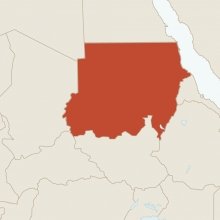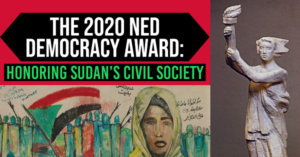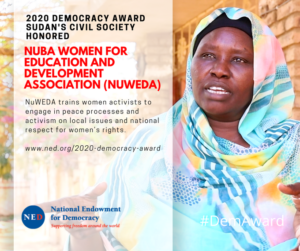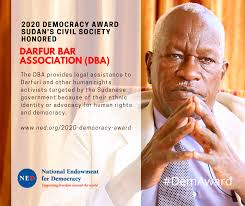
NDI
The removal of Sudan from a list of state sponsors of terrorism will release essential investment but some analysts believe the deal could jeopardize its fragile democratic transition.
The State Department will take Sudan off a list of countries that sponsor terrorism, clearing the way for the East African nation’s fragile government to seek international assistance and, potentially, normalized relations with Israel, The Times reports:
Removing Sudan from the terrorism list was a necessary precursor to it becoming the latest Arab state to broker an official détente with Israel. Two U.S. officials said that Sudan and Israel could normalize relations in days, once details of the removal from the terrorism list were completed. …But officials in Sudan’s fragile transitional government have been divided on whether to formalize diplomacy with Israel
As recently as last week, Prime Minister Abdalla Hamdok of Sudan said he opposed doing so. He had previously warned that the perception of being pushed into an American-backed, election-eve agreement with Israel could fuel unrest in his country, which is simmering over a severe economic crisis in which annual inflation soared to 212 percent last month, with shortages of food, bread and medicine.
 “This announcement has both huge symbolic and practical meaning to Sudan,” said Cameron Hudson, a senior fellow at the Atlantic Council and former chief of staff to the State Department’s special envoy to Sudan. “Practically, it removes a stigma that has deterred outside investment. It also frees up the international financial institutions and other commercial banks to reenter the country. This will move Sudan away from cash-based financing and through more diverse and reputable banking partners in the U.S. and Europe.”
“This announcement has both huge symbolic and practical meaning to Sudan,” said Cameron Hudson, a senior fellow at the Atlantic Council and former chief of staff to the State Department’s special envoy to Sudan. “Practically, it removes a stigma that has deterred outside investment. It also frees up the international financial institutions and other commercial banks to reenter the country. This will move Sudan away from cash-based financing and through more diverse and reputable banking partners in the U.S. and Europe.”
Sudan’s transitional government has been split on the issue of normalization with Israel, which could lead to domestic blowback amid the country’s fragile transition to democracy, Axios adds.
 But the transitional authorities are desperate to have sanctions lifted that are linked to its listing by the U.S. as a terror sponsor. That would be a key step toward ending its isolation and rebuilding its battered economy, which has plunged in recent months, threatening to destabilize the political transition to democracy, AP reports:
But the transitional authorities are desperate to have sanctions lifted that are linked to its listing by the U.S. as a terror sponsor. That would be a key step toward ending its isolation and rebuilding its battered economy, which has plunged in recent months, threatening to destabilize the political transition to democracy, AP reports:
Jonathan Schanzer at the Washington-based Foundation for Defense of Democracies said removing Sudan from the terrorism list is an important achievement because Khartoum has helped fight Sunni extremists for nearly two decades and has worked to remove Iranian influence from Sudan since 2012.
“In this way, the country has addressed the reasons for its original listing as a state sponsor of terrorism,” he said. Schanzer, a former terrorism finance analyst at the Treasury Department, said now that the delisting is to occur, it will important for the Trump administration to prioritize a normalization agreement. “The stars are aligned for such a deal,” he said. “It just needs a push.”
 The normalization of ties with Israel remains hugely contentious in Sudan and groups from across the political spectrum have expressed displeasure, if not anger, with the unelected transitional government for allowing it into the delisting process. For that reason, some analysts criticized the effort as self-serving and potentially reckless, The Post adds.
The normalization of ties with Israel remains hugely contentious in Sudan and groups from across the political spectrum have expressed displeasure, if not anger, with the unelected transitional government for allowing it into the delisting process. For that reason, some analysts criticized the effort as self-serving and potentially reckless, The Post adds.
“Washington should already have delivered the kind of political and economic relief necessary for Sudan’s make-or-break transition to succeed,” said Zach Vertin, a nonresident fellow at the Brookings Institution. “Instead, the Trump administration held out, extorting a fragile democracy in the service of its own domestic political ends.”
 Civil society groups critical to Sudan’s revolution – the Regional Centre for Development and Training (RCDCS), the Nuba Women for Education and Development Association (NuWEDA), and the Darfur Bar Association (DBA) – were recently honored with the 2020 National Endowment for Democracy (NED) award (above), in recognition of “working tirelessly to strengthen civil society in Sudan.”
Civil society groups critical to Sudan’s revolution – the Regional Centre for Development and Training (RCDCS), the Nuba Women for Education and Development Association (NuWEDA), and the Darfur Bar Association (DBA) – were recently honored with the 2020 National Endowment for Democracy (NED) award (above), in recognition of “working tirelessly to strengthen civil society in Sudan.”
In an analysis for the Washington Institute’s Fikra Forum, Overcoming History: Sudan’s Uncertain Transition to Democracy in the Face of Military Pressure, Areig Elhag emphasizes how the Sudanese military’s attempts to consolidate power are clashing with the real changes called for by the public through recent protests and supported by Hamdok.







